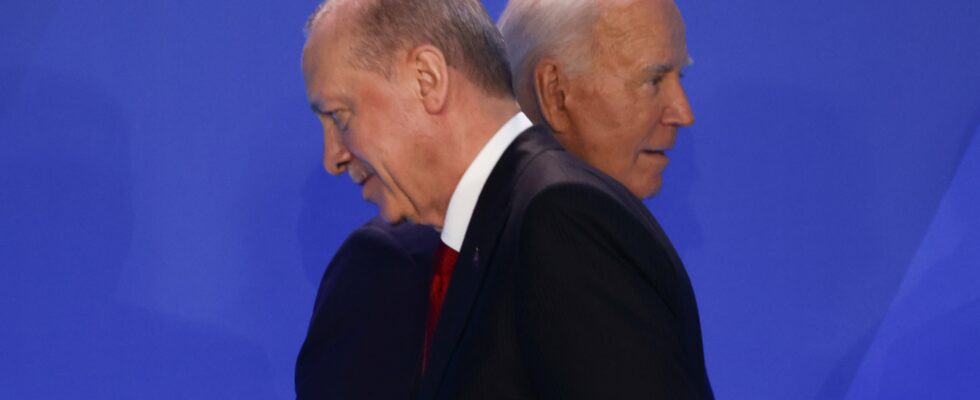A historic exchange since the end of the Cold War. This Thursday, August 1, Russia and Western countries, with the United States at the forefront, transferred 26 prisoners. On the Western side, 16 people were released, with the highlight being American journalist Evan Gershkovich and former Marine Paul Whelan, as well as Russian opponents imprisoned by the regime, such as Nobel Peace Prize winner Oleg Orlov, Russian-British journalist Vladimir Kara-Mourza and former collaborator of Alexei Navalny Lilia Tchanycheva. On the Russian side, Vladimir Putin notably obtained the release of FSB agent Vadim Krassikov, who was serving a prison sentence in Germany following his conviction for murder in Berlin.
And so it was in Turkey that these historic negotiations, which lasted more than two years and could have even led to the release of Alexei Navalny, finally came to a conclusion. This Thursday afternoon, the planes carrying the various protagonists of this exchange, who came from all over the world – from the United States and Russia, but also from Germany, Poland, Slovenia, Norway and Belarus – landed in Ankara.
A strong symbol for the government of Recep Tayyip Erdogan, who was obviously delighted to have been at the center of events. The Turkish intelligence services “carried out in Ankara the most important prisoner exchange operation in recent times,” the Turkish presidency boasted on Thursday.
The Turkish state news agency, Anadolualso stressed the role played by Turkey in this operation. “Turkish intelligence services brought together representatives of these seven countries in Ankara in July,” security sources said, affirming that “during these discussions, the intelligence agency played a central role in mediating the negotiations that led to the exchange.”
Key role or overestimated?
Turkey has often been the go-to broker between the United States and Russia in recent years, as diplomatic relations between the two powers have been at their lowest point since the start of the war in Ukraine. “Since no other NATO ally has a political dialogue with Russia, Turkey was, in a way, the only actor that could have achieved this,” Ozgur Unluhisarcikli, director of the Ankara office of the German Marshall Fund, told the New York Times. Joe Biden, for his part, thanked President Erdogan on Thursday “for his efforts to ensure the smooth running of the prisoner exchange,” the Turkish presidency wrote in a statement.
Thus, in April 2022, Turkey had already served as the framework for a prisoner exchange between Moscow and Washington between Trevor Reed, a US Marine imprisoned in Russia, and a Russian pilot detained by the United States. Last September, Russia and Ukraine had also exchanged 215 Ukrainian prisoners of war, including fighters from the Azov Battalion, for a close friend of the Russian president and 54 other people. The Ukrainian fighters were again released in Turkey, and both the Ukrainian Minister of Foreign Affairs and President Biden’s national security adviser, Jake Sullivan, had subsequently thanked the Turkish government for its role as facilitator.
But from there to placing Ankara as the main actor having unblocked these negotiations, the step is immense. The biggest obstacle to this exchange was in reality within the West itself. And more particularly in Germany, with the controversial release of the Russian FSB agent, Vadim Krassikov. Vladimir Putin had made it clear that an exchange could not take place without the latter returning to Moscow.
Almost weekly discussions are said to have taken place between Washington and Berlin, with the United States pushing to convince the German government to release the man who had been sentenced in 2021 to life imprisonment for the murder in the heart of Berlin two years earlier of a former Chechen separatist commander. Everything finally broke through in the American capital four months ago, during a visit by German Chancellor Olaf Scholz to President Biden. A reversal in which Turkey does not seem to have played a leading role.
The balancing act of Turkish diplomacy
But for Ankara, these secret negotiations between Western governments and the identity of the people released seem to ultimately matter very little. Much less in any case than the symbol of the arrival and departure on the tarmac of Ankara of these 26 Western and Russian prisoners, a great success in this intermediary position that Recep Tayyip Erdogan has wanted to give himself since the beginning of the war in Ukraine.
Since 2022, Turkey has been playing a real balancing act to place itself at the center of the international chessboard. To the point of saying almost everything and its opposite from one day to the next. One day, Turkey, a member of NATO, seems to do what is necessary to please its Western partners. Whether by bringing about a grain agreement between Ukraine and Russia in 2023 – which ultimately became obsolete – but also by finally lifting its veto for Sweden’s entry into NATO, by providing military support to Ukraine and even declaring last summer that kyiv “deserves to join” the Atlantic Alliance.
But Turkey has never cut ties with Russia. Erdogan continues to call Vladimir Putin “my friend”; trade between the two countries has not slowed since the start of the war, far from it; and Kremlin spokesman Dmitry Peskov even said on Thursday that a visit by Vladimir Putin to Turkey was in the works.
A spokesman for the Turkish Ministry of Foreign Affairs told the New York Times that, “although the country disagrees with Russia on many fronts, it was able to compartmentalize these differences to continue to cooperate in other areas and preserve trust with both sides.” And while this game on both sides can be tense, especially among Westerners, it sometimes allows Turkey to find itself at the center of the world. As this Thursday, on the runway in Ankara.
